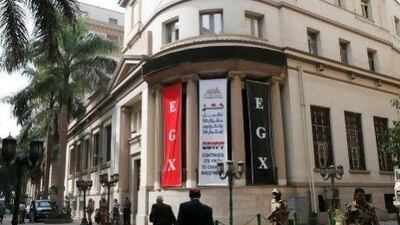A tax on investments that is being adopted to plug Egypt's budget deficit has sparked a wave of criticism from the business community, led by the chairman of the stock exchange.
Dividend payments and profits from mergers, acquisitions and asset revaluations will be taxed 10 per cent starting next month. Taxes would not be levied on profits gained through trading in stocks.
The government also plans to increase the income tax levied on individuals and companies earning more than 10 million Egyptian pounds (Dh6.1m) a year to 25 per cent, from 20 per cent.
The plan has provoked an outcry from investors, who fear it could derail recovery prospects and deter foreign investment.
"It's not the right timing," said Mohamed Abdel Salam, the chairman of the Egyptian Exchange. "The stock market is emerging from a liquidity crisis following the revolution, and we are putting our best efforts to bring back Arab and foreign investors."
The move comes as the country's government grapples with the economic aftermath of the revolution that ousted Hosni Mubarak from the presidency. The budget for the fiscal year starting next month forecasts expenditure of 86.5 billion pounds, up from 69bn pounds last year, while the country's deficit is expected to widen to 10.9 per cent of GDP from 8.6 per cent this year.
"It remains to be seen if revenues made from taxing companies and individuals will outweigh the potential capital outflow from foreign investors following this draft law," said Mr Salam.
The announcement sent shares of Egyptian companies to their lowest in more than seven weeks. The country's benchmark EGX 30 Index declined 2.6 per cent to 5,361.88 points.
"There were a lot of complaints to the stock exchange today," said Teymour el Derini, the head of sales at the Cairo brokerage Naeem. "We are all against additional taxation, but everyone is waiting to see what will happen."
"It's muddled thinking," said Sherif Raafat, the chairman and managing director of Concord Corporate Finance and Securities in Cairo. "It's one of these measures that came out without looking at the consequences, without sounding out those involved, whether they are brokers or companies."
A study being drafted to address the harm to the industry would be presented to the cabinet and the military in the next three weeks, Mr Abdel Salam said.
"I understand where they are coming from, but it's giving out the wrong signal to foreign investors at a time where most people are looking at political risk, country risk and currency risk," said Haissam Arabi, the chief executive at Gulfmena Investments in Dubai. "People wouldn't mind paying if they see tremendous growth opportunities, but with the country's current outlook, it makes investing in Egypt less interesting. Most people will say 'what's next, corporate tax law'?"
The new tax has also drawn criticism from Gulf companies operating in Egypt.
"A decision like this should have been given enough time to be debated, for the law to go through the appropriate channels and provide investors with enough time to study the ramifications and decide whether to divest or invest," said Khaldoun Tabari, the chief executive of the UAE engineering company Drake & Scull International, which owns Drake & Scull Egypt.
bhope@thenational.ae

